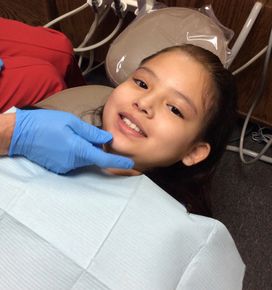Teeth are Better Friends with Whole fruits

MaKayla came to see us for her 6 month check up and preventive care. She has had an exciting summer and we discussed the pattern of dental tooth eruption and other issues of dental health. She is so very smart. Some of the questions she asked merit our journey through that information.

So come along with MaKayla and me (Dr Teresa Wade), as we explore the marvel of dental care and we recognize the August 18th, 2017 statement issued by the American Dental Association and the American Association of Pediatric Dentistry
The statement suggested guidelines for the introduction juice into a child’s diet should it become necessary. Limits for children whereby juice is essential are as follows:
Infants less than one year of age: NO more than 4 oz per day
Toddlers 1-3 years of age: 4 ounces per day
Children aged 4-6 years: Limit juices to no more than 4-6 oz per day
Children aged 7-18 years: Restrict juices to less than 8 oz per day.
These new restrictions come with the recognition that juices might offer some good, but the more harmful potentials generally out-weigh the good. This is related to the very large sugar component of these juices; this factors in to contribute to caloric consumpotiion as well as dental caries resulting in tooth destruction. Couple those with the deficient protein and fiber there simply is no benefit to child younger than one year and no advantage to whole fruits for older children.
This statements echoes the policy statement issued on juice consumption put for the by the American Academy of Pediatrics, last June (2017). The statement was issued since children and teens tend to be the highest consumer of juices and juice drinks; almost half of their fruit intake being in the form of fruit juice rather than whole fruits. Additionally, 1/3rd of teenagers consume sports drinks and ten to fifteen percent drink energy drinks.
The adverse side of these can also lead to constipation, especially in infants and compromised fluoride consumption which water would have provided.
The carbohydrate concentration of juice drinks range from 11 grams percent to 16 Gm Percent, as compared to human breast milk milk and infant formulas weighing in at roughly 7 Gm Percent.
Those experts advise:
Children aged 1- 4 years old :1 cup of fruit per day.
Children aged 10 through 18 years old: 2 cups of fruit per day.
Although whole fruit is encouraged, up to one-half of the servings can be provided in the form of 100% fruit juice (not fruit drinks).
Fruit juice offers no nutritional advantage over whole fruit. There is no nutritional indication to give fruit juice to infants younger than 6 months.
Juice should NOT be offered in a bottle to toddlers; toddle should use a cup.
Infants should be encouraged to consume whole fruit that is mashed or pureed. After 1 year of age, fruit juice may be used as part of a meal or snack. Toddlers and young children can be encouraged to consume whole fruit instead of juice.
MaKayla and I (Dr Wade) hope you’ve learned a bit about your teeth, the need for whole fruits, and that you come see us really soon at Teresa WadeDDS-Family Dentistry 612 Hospital Drive Andrews, TX.
Call today to make an appojntment (432) 523-7782 or visit us online.
Mother Teresa reminded us, “We shall never know all the good that a simple smile can do.” Smile, smile, smile!
This article was written by Dr Teresa Wade, for her dental practice and the narrative or photos cannot be reproduced without her written consent.
About the Business
Have a question? Ask the experts!
Send your question

